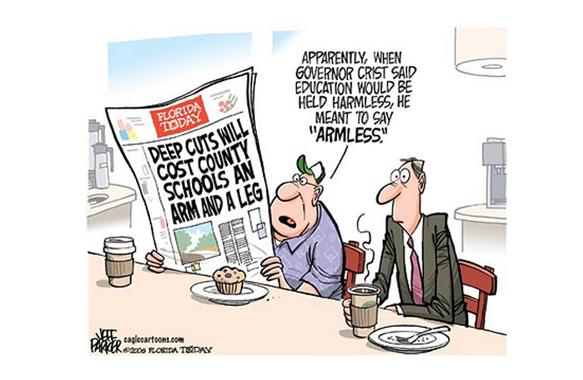DID YOU KNOW?
- Florida has one of the lowest graduation rates in the country.
- Florida ranks 50 out of 50 in state funding per pupil.
- 61% of our tenth graders do not read at grade level.
- 578 Florida students drop out of school every day.
THIS IS NOT THE HIGH QUALITY EDUCATION THAT FLORIDA’S VOTERS DESIRE
HOWEVER, YEARS OF FUNDING CUTS AND MISGUIDED POLICIES HAVE LED TO:
- Underpaid and under-qualified teachers
- Low graduation and high dropout rates
- Over-use of grade retention
- Increased school violence
- Teaching to the test
- Elimination of art, music, language and PE programs
- Elimination of after-school and summer school
OUR 2.6 MILLION STUDENTS DESERVE BETTER
Lawsuit Challenging Florida School Funding Seeks To Broaden, Cites Vouchers, Charters, Pre-K As Evidence of State Failures
A sweeping lawsuit that argues Florida failed to adequately fund its public education system should be amended so that the state’s support of voucher programs and charter schools can also be challenged, attorneys for the plaintiffs said today. They have asked the court to allow them to amend the lawsuit, filed in 2009.
The lawsuit — with the Orlando-based Fund Education Now as one of the plaintiffs — argues Florida has failed to provide its students with a “uniform” and “high quality” public education demanded in the Florida Constitution.
The original lawsuit cited shrinking budgets, low graduation rates and a faulty school accountability system, among other problems.
See the Fund Education Now Lawsuit.
The amended complaint says Florida hasn’t funded its pre-K program adequately and has improperly allowed charter schools and two other choice programs, the Tax-Credit Scholarship Program and the McKay Scholarship program, to flourish.
“Florida is failing our public school students,” said Jodi Siegel, executive director of Southern Legal Counsel, which has brought the lawsuit. “The State does not provide sufficient resources and appropriate services for public school children, especially children from low income families or those with special learning needs.”
The two voucher programs provide scholarships students from low-income families and students with disabilities can use to attend private schools.
But the lawsuit’s complaint says those programs do not require that students take the same courses or standardized tests as youngsters in public school, nor do they require the private school teachers — even those that work with disabled kids — to be well educated. The scholarship programs also send most students to religious schools.
The new complaint says by setting up these programs, the Florida Legislature “intended to divert public money” to private institutions.
Florida’s first voucher program, the Opportunity Scholarship program, was challenged in court and shut down as unconstitutional by the Florida Supreme Court. But the other two programs have not been challenged previously.
Charter schools — public schools run by private groups — are mentioned, too, with the complaint saying they create an “inefficient duplication of expenditures.”
<(a target=new href=http://www.redefinedonline.org/2014/04/funding-lawsuit-ranges-school-choice-debate/>The RedefinED blog — affiliated with the Tax Credit program — wrote back in April about the possibility that Florida’s so-called school choice programs might be subject of attack in a revised lawsuit. It’s interesting background reading to today’s news).
The state’s Voluntary Pre-Kindergarten program also is inadequate, the complaint says, because it is poorly funded and does not require “highly qualified” teachers, among other problems.
The case is scheduled for trial in August, 2015.












Yet, graduation rates alone cannot be the measure of quality education. Not the following concern where apparently Miami-Dade is using “crash course” adult education programs over the period of 20 days to provide unqualified seniors with (on paper) 68 hours of contact time in an unmet course area. Also, virtual school credits are being awarded with insufficient supervision to prevent cheating, and finally, attendance records are not being kept with integrity nor are associated rules and legislation being adhered to in terms of contact hours earned.
More effort must be put into establishing high quality, rigorous education that produces graduates ready to sustain the US infrastructure and place in the global market place.
See my blog http://www.shawnbeightol.com for more writings